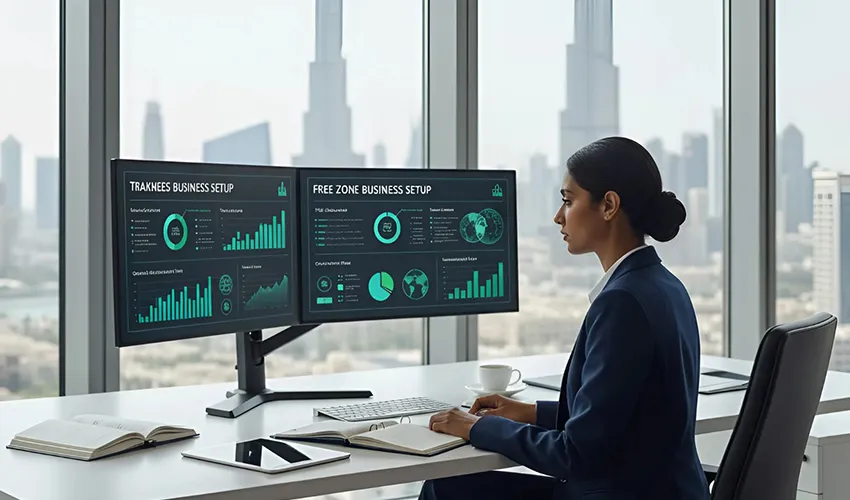Dubai is one of the most dynamic business hubs in the world, attracting entrepreneurs, consultants, and startups from all over the globe. When considering a business venture in Dubai, understanding the regulatory environment is crucial. Among the most common questions is the difference between Tarakhees and Free Zones and which option is suitable depending on the nature of your project.
This guide aims to provide a comprehensive overview of Tarakhees and Free Zones, including their roles, responsibilities, and how they impact businesses, without delving into pricing or setup procedures that may overlap with commercial pages.
What is Tarakhees?
Tarakhees is the regulatory arm responsible for certain master developments, ports, and industrial zones in Dubai. Unlike Free Zones, Tarakhees does not issue commercial licenses. Its main focus is on regulatory compliance, safety, environmental oversight, and infrastructure governance in areas under its jurisdiction.
Areas Covered by Tarakhees
DP World assets and ports
Nakheel master communities
Industrial and commercial projects under PCFC control
Tarakhees ensures that construction, fit-outs, and facilities comply with safety, environmental, and engineering standards.
Roles and Responsibilities
The key responsibilities of Tarakhees include:
1. Construction and design approvals: Reviewing architectural plans and amendments
2. Health, Safety, and Environment (HSE) compliance: Ensuring sustainable and safe operations
3. Fire and life safety oversight: Evaluating emergency preparedness systems
4. Environmental permits: Reviewing activities that may affect air, soil, or marine quality
5. Regulatory liaison: Coordinating with other authorities regarding permits and compliance
Inspections and Compliance
Businesses and projects in Tarakhees-controlled areas undergo several inspections:
1. Design review: Ensuring compliance with engineering standards
2. Fit-out assessment: Verifying building modifications
3. Fire and life safety checks: Certification for emergency readiness
4. Environmental clearance: Assessment for projects impacting air, water, or soil
These measures ensure that facilities in Dubai meet stringent safety and environmental standards.
Understanding UAE Free Zones
A Free Zone is a special area where investors can enjoy full foreign ownership and streamlined regulatory processes. Free Zones have their own authorities responsible for permits, approvals, and residency arrangements.
Key Features of Free Zones
- Full foreign ownership of businesses
- Specialized authorities managing permits and regulatory compliance
- Focus on specific sectors such as finance, logistics, media, and technology
Popular Free Zones in Dubai
1. DMCC (Dubai Multi Commodities Centre): Ideal for trading and commodities
2. DIFC (Dubai International Financial Centre): Financial services and fintech hub
3. JAFZA (Jebel Ali Free Zone): Logistics, manufacturing, and trading
4. IFZA (International Free Zone Authority): Quick regulatory approvals and flexible structures
5. DAFZA (Dubai Airport Free Zone): Aviation, technology, and logistics focus
6. Dubai Media City / Internet City: Creative and digital industries
Each Free Zone caters to a specific type of business, providing tailored regulatory frameworks for their sectors.
Tarakhees vs Free Zone: Key Differences
Feature Tarakhees Free Zones
Primary Role Regulatory oversight of safety, environment, and infrastructure Issuance of business permits and regulatory management
Commercial Licenses Not issued Issued by Free Zone authorities
Scope Specific ports, industrial zones, and master communities Dedicated zones for foreign investment across various sectors
Inspections Extensive HSE and environmental checks Compliance reviews handled internally by Free Zone authority
Focus Infrastructure safety and sustainability Business operations and regulatory facilitation
This comparison highlights that Tarakhees focuses on regulatory supervision, while Free Zones provide business facilitation and investor-oriented services.
Regulatory Compliance in Tarakhees Areas
Businesses in Tarakhees-controlled zones must adhere to regulatory frameworks for construction, environment, and operational safety. Key considerations include:
1. Facility compliance: Ensuring buildings meet engineering and safety standards
2. Environmental considerations: Projects with potential environmental impacts undergo review and assessment
3. Inspection schedules: Projects may be subject to multiple rounds of review to ensure ongoing compliance
4. Understanding these requirements helps entrepreneurs, consultants, and project managers navigate Tarakhees regulations efficiently.
Free Zone Regulatory Overview
While Free Zones provide smoother business facilitation, regulatory oversight still exists:
1. Sector-specific compliance: Each Free Zone has tailored regulations for the types of businesses they host
2. Document verification and approvals: Free Zone authorities manage permits and approvals internally
3. Residency arrangements: Free Zone authorities may coordinate visas or work permits associated with the business
4. Free Zones: designed to reduce regulatory friction for investors while maintaining compliance with UAE federal laws.
Choosing Between Tarakhees and Free Zones
The decision depends on project type, regulatory requirements, and operational focus. Consider:
1. Project nature: Industrial or logistics projects may fall under Tarakhees supervision
2. Operational priorities: Businesses prioritizing compliance and infrastructure safety may align with Tarakhees zones
3. Market focus: Free Zones cater to companies targeting international markets or requiring flexible ownership structures
It is essential to map your business activities and operational needs to the regulatory framework to ensure alignment.
Use-Case Scenarios
Business Type Recommended Approach
Trading / Import-Export Free Zones like JAFZA or DMCC
Logistics / Ports Tarakhees or JAFZA-controlled areas
Media / Technology Media City, Internet City, or DIFC
Finance / Consulting DIFC or DMCC
Manufacturing JAFZA, RAKEZ, or industrial zones under Tarakhees
Regulatory Ecosystem in Dubai
Dubai provides a versatile regulatory ecosystem with multiple zones catering to different business needs:
Corporate hubs: Sheikh Zayed Road, Business Bay, DIFC
Creative and digital hubs: Dubai Media City, Internet City, Dubai Design District
Industrial / logistics hubs: JAFZA, DP World Ports, DAFZA
Choosing the right regulatory framework ensures compliance while leveraging the advantages of each zone.
FAQs
Q1. Is Tarakhees a Free Zone?
No. Tarakhees is a regulatory authority overseeing safety, environment, and infrastructure in specific zones.
Q2: What is a Free Zone?
A Free Zone is a designated area that provides investors with regulatory benefits and sector-specific facilitation.
Q3: Can a business overlap between Tarakhees and Free Zone jurisdictions?
Yes. A business may operate in a Free Zone while its facility is located in a Tarakhees-controlled area. Regulatory compliance with Tarakhees is required in such cases.
Q4: Which option is better for startups?
Free Zones typically offer faster regulatory facilitation, while Tarakhees supervision is necessary for projects involving heavy infrastructure or industrial operations.
Conclusion
Understanding the difference between Tarakhees and Free Zones is vital for anyone exploring business opportunities in Dubai. Tarakhees ensures regulatory compliance, environmental safety, and infrastructure standards, while Free Zones focus on investor facilitation and sector-specific support.
Entrepreneurs, consultants, and startups should evaluate their project’s regulatory needs, operational requirements, and market focus before making decisions. By understanding the frameworks and compliance mechanisms, businesses can thrive in Dubai’s multifaceted regulatory environment.
For detailed guidance on establishing a business under Tarakhees regulations, explore our Tarakhees company formation services in Dubai








Comments are closed